
Emergency Dentist — Saginaw, TX
Fast Dental Treatment When You Need It Most

Emergency dentistry is not likely to be at the forefront of your mind, but if a dental emergency did occur, would you know what to do first? For many, the answer would likely be “go to the emergency room.” Unfortunately, many hospitals are not capable of treating your dental emergency. Saginaw Dental is more than prepared to not only get you out of discomfort but help you restore your smile and oral health to the fullest. If you’re experiencing a dental emergency, we’re here to help. Contact our dental office to speak with one of Dr. Renkuntla’s team members and schedule an appointment for emergency dentistry in Saginaw!
Why Choose Saginaw Dental for Emergency Dental Care?
- Sedation Dentistry Available for Optimal Comfort
- Advanced Technology for Fast Diagnosis & Treatment
- Dental Insurance Welcome & Flexible Financing Available
What to Do in a Dental Emergency

- Step 1: Call Us As Soon As You Can. We do everything we can to see emergency patients the same day they call us, and we’ll also give you first aid instructions for handling your situation until you can reach our office.
- Step 2: Visit Dr. Renkuntla for an Emergency Exam. As soon as you arrive, your Saginaw emergency dentist Dr. Renkuntla will see you for an examination. He will also alleviate any severe pain you may be in.
- Step 3: Review the Findings & Make a Plan. Renkuntla will review his findings with you and fully explain which treatments he recommends moving forward with, including their approximate length and cost. Together, you’ll make a plan for getting your oral health back on track.
- Step 4: Get Fast Dental Treatment When You Need It Most. At Saginaw Dental, our experienced team offers a wide range of treatments here in-house, so we’ll be able to get to work repairing your smile and protecting your teeth right away. If needed, we offer sedation dentistry for particularly anxious or uncomfortable patients to make treatment as pleasant as possible.
The Most Common Dental Emergencies
Dental emergencies typically come in two forms. The first category is emergencies caused by sudden injuries, often from sports or an accident. The other category includes serious issues that have been developing for a long time because of poor oral hygiene or bad chewing habits. Thankfully, our team here at Saginaw Dental is well-prepared and well-equipped to handle whatever type of dental emergency you or your loved one may be facing. As soon as you can, give us a call so we can help you take the appropriate next steps. If you experience any of the following emergencies, don’t hesitate to get in contact with us!
Understanding the Cost of Emergency Dentistry
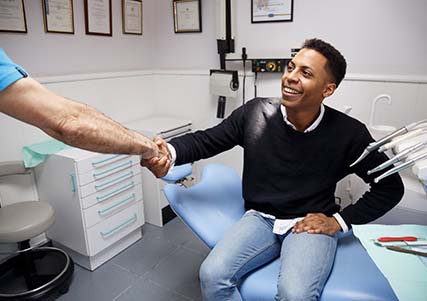
Patients often assume that there’s a flat fee for emergency dentistry. That’s not the case! After all, we need to learn about your symptoms, examine your condition, and review your treatment options before we can provide you with an accurate estimate of the cost. The good news is that our Saginaw dental team has provided some helpful information on the topic below. So, if you want to learn a little more about the price prior to your appointment, you can!
Why Every Dental Emergency is Different
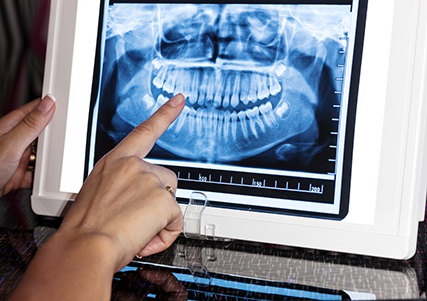
Simply put, patients visit us for emergency dental care for a number of reasons – from persistent toothaches to bleeding gums and knocked-out teeth. So, it would be irresponsible to provide an estimate of the cost without knowing the type of dental injury and the treatment that’s needed to address it properly.
For example, while minor tooth pain caused by decay may only require a thorough cleaning and a dental filling, more severe emergencies like cracked or avulsed teeth may require extraction, which comes with its own unique costs. Rest assured, we’ll carefully examine your dental emergency and provide recommendations that best get you out of discomfort and restore your smile at your visit.
Does Dental Insurance Cover Dental Emergencies?
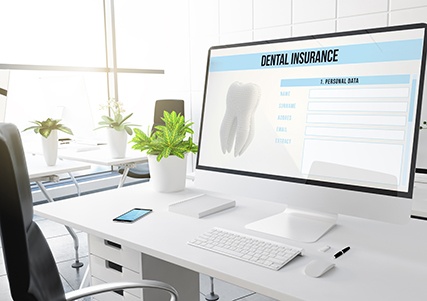
Dental insurance providers do typically cover a portion of the cost. That’s why we recommend looking through the fine print to see what’s covered and if there are any restrictions that need to be considered, like waiting periods or annual maximums. If you aren’t familiar with your benefits and you’re not sure where to start, don’t worry – we can help! We’re proud to welcome many popular providers, including Aetna, Cigna, and Delta Dental.
Other Options for Making Dental Emergencies Affordable
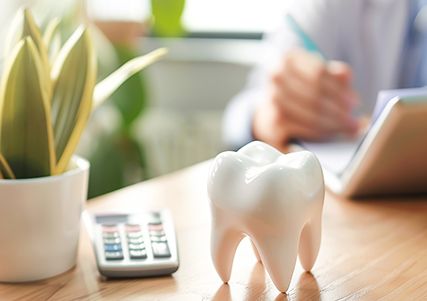
Don’t let not having dental insurance stop you from getting the emergency dental care you need. Our Saginaw dental team offers two other financial solutions: periodic special offers and CareCredit flexible financing. While our special offers help patients save on essential preventive and restorative care, CareCredit offers payment plans (oftentimes with little-to-no interest attached). If you would like more details, don’t hesitate to give us a call or ask at your visit!
Taking Care Of Your Smile Can Save You Money – Here’s How
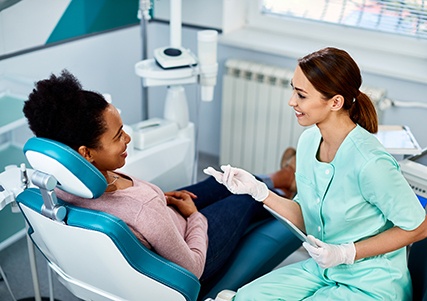
If you are struggling with a painful toothache, your gums are bleeding when you floss, or you’re experiencing any other warning signs of dental damage, don’t wait – contact us ASAP to schedule an emergency exam. This ensures that we can intervene before the decay or infection gets worse.
It’s also crucial that we mention the importance of good oral hygiene habits. Although it might seem insignificant, “small” steps, like brushing and flossing your teeth each night before bed, go a long way in keeping your teeth and gums healthy.
Keys to Preventing Dental Emergencies

While we always love seeing our patients at Saginaw Dental, it’s better to prevent dental emergencies than to deal with them. Luckily, there are a few excellent ways to drastically reduce your chances of experiencing a dental crisis. Here are a few habits you can adopt to preserve your oral health, prevent painful oral infections and injuries, and spare yourself the expense of having to treat preventable dental conditions. For more information, please contact our staff online.
Maintain Good Oral Hygiene at Home
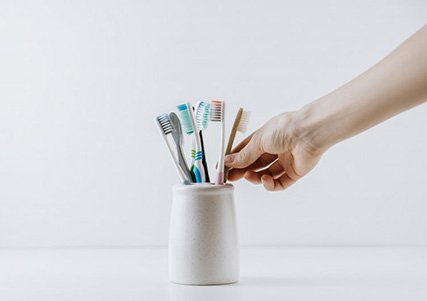
Your daily oral hygiene regimen is your first line of defense against oral injuries and infections. Make sure you’re brushing, flossing, and using antibacterial mouthwash every day to keep the harmful oral bacteria that cause tooth decay and gum disease at bay. Habitually keeping your mouth clean can make the difference between living comfortably with your smile and being suddenly struck with a miserable and agonizing toothache.
Stick to a Nutritious Diet

Consuming too much sugar and starch leaves a residue in your mouth that provides harmful oral bacteria with the fuel they need to multiply rapidly so they can infect your teeth and soft tissues. Acidic foods and beverages like soda, red wine, and sour candy are especially bad because they erode your enamel on contact. Luckily, healthy foods like fibrous fruits and veggies and fresh meat are great for your oral and overall well-being.
Visit Your Dentist Regularly
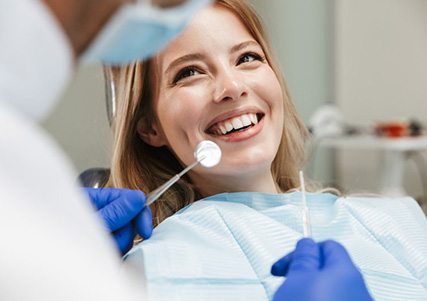
The American Dental Association recommends seeing us twice yearly for routine exams and cleanings. These visits allow us to monitor the state of your oral health, thoroughly clean your mouth, and correct issues in their early stages. Keeping up with these appointments can prevent many dental emergencies down the road.
Use Tools to Open Packages, Not Your Teeth

Using your teeth to open bottles or packages is an excellent way to chip, crack, or fracture them. These habits have led to much oral pain and many dental emergencies, so please use the proper tool to open boxes and beverages. Keep in mind that while emergency dental appointments can be quite costly, box cutters and bottle openers often go for as little as a few bucks.
Wear a Mouthguard
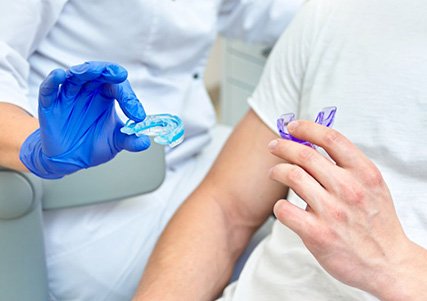
Many people enjoy playing sports for exercise and recreation, and many other people reflexively grind their teeth in their sleep. If you fall in either of these groups, please invest in a nightguard or an athletic mouthguard to protect your smile from damage. We offer these appliances at our office, and we customize each one to fit the patient’s teeth perfectly so they can enjoy the best protection possible.
Dental Emergency FAQs
Will My Toothache Go Away on Its Own?
The majority of toothaches are caused by severe dental decay, which means they won’t resolve on their own without professional dental attention. Because of that, you should schedule an appointment with Dr. Renkuntla as soon as you notice any tooth pain to ensure nothing is wrong. By addressing the underlying problem early on, you can avoid experiencing severe complications and needing extensive dental work down the line.
How Should I Sleep with Tooth Pain?
If a nagging toothache is keeping you up at night, try sleeping with your head propped up on a few pillows. Keeping your head elevated will prevent blood from rushing to it and intensifying the pain. Additionally, you can take over-the-counter pain medication as needed or use a cold compress to alleviate your discomfort. Make sure you avoid eating acidic, cold, or hard foods right before bed as well!
Can the Emergency Room Remove a Tooth?
Only licensed dentists are able to perform tooth extractions. It’s considered illegal for a person to do an extraction without the right training and education required, even if it’s in a hospital setting. An emergency room will only be able to provide antibiotics and pain medication for your toothache – not address the issue causing it. For that reason, you should always visit a dentist when it comes to problems with your teeth and gums. Depending on your situation, Dr. Renkuntla may decide that an extraction isn’t necessary and suggest root canal therapy instead.
What Does Throbbing Tooth Pain Mean?
Throbbing tooth pain is often a sign of an infection or inflammation within the tooth. When a cavity inside the tooth allows air and bacteria to reach the inner portion, it can result in irritation and potential infection of the pulp nerves. A persistent toothache can also occur if decay is present. There are some instances where throbbing teeth are the result of chronic teeth grinding and clenching.
What if My Toothache Suddenly Disappears?
If you’ve been suffering from a severe toothache that suddenly goes away on its own, this doesn’t necessarily mean that the underlying issue has been solved. In fact, it could mean that the situation is much worse than it was when it was painful. That’s because the lack of pain could indicate that the nerve inside your tooth has died due to an infection. If left untreated, this could even spread to the rest of your mouth!
Simply put, even if you’re no longer experiencing tooth pain, it is still vitally important that you see Dr. Rekuntla as soon as possible so that they can determine the appropriate treatment to save your smile!
Can I Pop a Dental Abscess on My Own?
Never, under any circumstances should you ever attempt to pop a dental abscess on your own. If you notice one forming, please contact Dr. Rekuntla as soon as possible, as this type of dental infection is considered an emergency.
Popping a dental abscess on your own will only expose your mouth to more bacteria and will irritate the area even more. Delaying treatment can also allow the infection to spread throughout the mouth and body, including your neck, throat, and head.
Is a Knocked-Out Baby Tooth a Dental Emergency?
Thankfully, baby teeth are supposed to come out, so there’s no need to try and put them back into your child’s open socket if it gets knocked out. Unfortunately, however, sometimes baby teeth can come out too soon, which is why it’s important to schedule an appointment with Dr. Rekuntla to ensure that no permanent damage has occurred. Sometimes, permanent teeth can erupt too early if a baby tooth falls out prematurely.
If your child is injured and the bleeding does not stop or if you believe they have damaged their jaw, please head straight to the nearest emergency room. Dr. Rekuntla will be happy to examine their teeth once they are discharged.
Is It Safe to Repair Dentures with Superglue?
No, it is not safe to repair your dentures with superglue. The chemicals used in superglue can be toxic and could result in an allergic reaction in some patients. Glue residue can also affect the taste of your food.
Additionally, superglue doesn’t do well in damp environments like your mouth, so even if it did work, the hold will not likely last for very long after it’s applied to your dentures.
I Need a Dental Checkup & Cleaning I Have a Cavity or Broken Tooth I Would Like a Straighter Smile I am Looking for a Dentist for My Child I am Missing One or More Teeth I Would Like to Enhance My Smile I am Worried About Bleeding Gums View Our Services